Constitutional Changes
Ambassador Roberta Lajous
Wilson Center Fellow; Researcher, El Colegio de Mexico; former Mexican Ambassador to Austria, Bolivia, Cuba, and Spain
From the National Palace, not Congress, President López Obrador (AMLO) announced on February 5th a potpourri of 18 sweeping constitutional reforms that severely downgrade Mexican democracy. The Supreme Court would be debilitated by having its members openly elected, independent regulatory agencies would disappear, the electoral authority would be back under the control of the President, and the ongoing militarization of the police force would be formalized. At the same time, with a clear authoritarian streak, and going against all international standards and recommendations, the instances where individuals could go to prison before being judged are broadened to include even the incorrect filing of taxes. To sweeten the deal, accompanying laws propose pie in the sky pensions, which would be raised by as much as 100% of workers’ final salaries, threatening financial disaster for the treasury. These proposed changes lack the needed majority to be approved by this Congress. Therefore, they become the electoral platform for AMLO´s handpicked successor, Claudia Sheinbaum. Once again, the President has been successful in setting the agenda for public debate but, this time, at the cost of leaving no oxygen for Sheinbaum to express her own views.
Since there is no possibility of presidential reelection in Mexico, AMLO wants to prolong his power well beyond his 6-year term. Sheinbaum, if elected, will have to remain under AMLO’s control and be subjected to the threat of a recently approved poll that could revoke her mandate within two years of taking office. As of today, given the influence AMLO holds over a significant part of the electorate through his daily press conference, it will be a real challenge for the opposition candidate, Xóchitl Gálvez, to make the case against these proposed reforms. However, if someone can successfully do it, it is her. She is a charismatic leader who comes from poverty and discrimination but propelled herself through higher education to become a successful businesswoman and, later, a democratic politician.
Mexicans need a new government respectful of checks and balances—not this new constitution that would throw Mexico back to its authoritarian past. The last chance to rectify the course taken by AMLO will be the June 2nd election, the biggest Mexico has ever had, where the two full houses of Congress will be elected along with many state legislators, governors, and mayors. The unified opposition platform of the three main parties, PAN, PRI, and PRD, along with the civil society organizations, will present an alternative project. They have organized a mass rally for next February 18th in defense of democracy in major cities inside the country and abroad. Hopefully they will show the muscle needed for the campaign, which officially starts March 1st. Provided they remain united, this coalition could stop the militarization of society and the regression to an unrestrained presidential system.
AMLO’s Last-Minute Mini Sexenio
Alejandro García Magos
Lecturer, University of Toronto
The vertigo of losing power has finally caught up with AMLO. On February 5, 2024, a seven-month mini sexenio commenced, during which, at the eleventh hour, he will attempt to fulfill his promise of laying the groundwork for a “transformation” and securing a place in history. Despite five years and two months having passed without achieving his promised objectives —namely, the reduction of criminal violence and the acceleration of economic growth— it is only now, mere months before relinquishing power, that 20 constitutional reforms are being proposed to finally steer the country towards peace and prosperity.
AMLO is not the first president to try to salvage his legacy at the last minute. José López Portillo tried it in 1982 when, three months before leaving the presidency, he decreed the nationalization of the banking sector, leaving a political and economic mess for his successor, Miguel de la Madrid. Similarly, AMLO proposes an agenda for the next government and a change of political regime for Mexico, which still democratic to this day. Indeed, his proposals dismantle, no more and no less, the independence of the Judiciary, eliminate the autonomy of electoral authorities, and militarize public security. AMLO launches these proposals, that have already foundered in Congress, as if throwing a Hail Mary pass into the end zone. It would be amusing if not for the fact that the future of the country is at stake.
This package of reforms is an implicit acknowledgment of the shortcomings of AMLO's government and the fact that time and his political capital have run out. This seven-month mini sexenio can be seen as the tale of a president who missed his chance and now, in the twilight of his administration, seeks to leave a symbolic mark. In the absence of tangible results, laws are being proposed. Regardless of the outcome of these reforms, the quality of life for Mexicans is unlikely to change. Despite the high expectations raised by AMLO six years ago at the beginning of his government, his actual record is underwhelming. As for the mini sexenio that begins, what can be said, except that perhaps the saying about history repeating itself twice, first as tragedy and then as farce, holds true.
The Politics of AMLO’s Reform Proposals
Luis Rubio
Mexico Institute Advisory Board Member; Chairman, México Evalúa; Former President, Consejo Mexicano de Asuntos Internacionales (COMEXI); Chairman, Center for Research for Development (CIDAC), Mexico
There are at least three factors that led President Lopez Obrador to send Congress a package of extremely ambitious (and deleterious) constitutional amendments. The first and most obvious one is that this puts him in a position where he can advocate for a vision of the future without violating the letter of the electoral law, even though he’s doing it precisely to circumvent it. The second rationale is to provoke an opposition outcry to consolidate his base. The third, and most puzzling, is to control his candidate. While the first two can be denominated as ‘politics as usual,’ the third is the most transcendent, for it entails the complexity of the coming race.
The context of the President’s thrust is very clear: he has spent the last five years fully devoted to the succession process now underway. Rather than an ambitious development project like all his predecessors pretended to advance (regardless of their respective merit or soundness), President Lopez Obrador is unique in that he shunned development and concentrated on two things and two things only: one was to eliminate or neutralize all or most institutional checks on presidential power in an attempt to recreate the all-powerful presidency of yesteryear. The other was to build and secure an electoral base to win the 2024 election. He measures his success or failure by the result of the June 2 election. Now that the election looms, the question is whether he can accomplish his only objective. And the constitutional reforms are an important element in this regard.
The President has now created a complex relationship with his anointed candidate, Claudia Sheinbaum. For AMLO to reach his goal, she must win the election; however, were she to win, she would have to alter course, for the roadmap designed by AMLO would not allow her to be successful as it would only deepen the polarization in which the President thrives. AMLO cannot be repeated: nobody can duplicate his history or skills, thus making it impossible for his successor to replicate his tactics, starting with the permanent attempt to polarize and sow discord. By now, she has embraced the President’s reform proposals for she cannot say otherwise if she wants to win. Yet, by embracing them, she loses the support of many Mexicans that would rather seek a more harmonious polity. Thus, the President’s reforms evidence the divergent interests between the President and his candidate, which might well create the conditions for a truly competitive presidential race.
The content of the proposed reforms is now the subject of serious analysis and debate, for they would upend not only the attempt to build a democratic polity of the last several decades, but also a market-based economy embodied in NAFTA/USMCA. Beyond the specifics of the proposed reforms, the politics behind them are all but clear: the President wants to win the coming election and will stop at nothing to guarantee that result.
AMLO’s Constitutional Reform Proposals
Andrew I. Rudman
Director, Mexico Institute
Many analysts have characterized the package of constitutional reforms presented by President López Obrador (AMLO) on February 5 as a political maneuver intended to create wedge issues for the campaign and to further solidify AMLO’s Fourth Transformation by making it more difficult for a future president to reverse various measures and programs. The maneuver may be good politics, but the proposed reforms are not good policy. Their passage would undermine transparency and weaken civil oversight of elected officials and will undermine confidence in the integrity of Mexican democracy.
One of the proposed reforms calls for the direct election of judges – a change from the current presidential appointment system. While this may sound democratic, and indeed judges are elected in some jurisdictions in the United States, AMLO’s reforms would politicize the third branch of government which is meant to act, in the words of U.S. Supreme Court Chief Justice John Roberts, “like umpires. Umpires don’t make the rules, they apply them. The role of an umpire and a judge is critical. They make sure everybody plays by the rules…” In the same testimony, he noted that, “judges are not politicians who can promise to do certain things in exchange for votes.” The proposal to choose judges through popular vote is perhaps most concerning with respect to the Supreme Court in light of proposed reforms on the internal structure of the Court and AMLO’s direct and personal attacks on justices whose decisions went against his policies.
A second reform would eliminate several independent agencies designed to ensure transparency and protect Mexican consumers. Among those to be abolished are COFECE, Mexico’s Competition Commission, which is responsible for “protecting and promoting competition in the markets to contribute to the welfare of families and the economic growth of the country,” and the National Institute for Transparency, Access to Information, and Protection of Personal Information (INAI). COFECE is “responsible for the efficient functioning of markets to the benefit of consumers,” while INAI provides the transparency required to eliminate precisely the type of corruption that AMLO has sworn to eliminate. Nevertheless, AMLO calls these independent institutions "useless, factious, onerous and anti-popular" and argues that they should be eliminated so that its resources can be allocated to payment of pensions and other direct cash transfer programs. No institution is perfect, and it may indeed be appropriate to consider reforms to the functioning of COFECE, INAI, and some of the other identified institutions. However, their functions provide critical oversight of government, which is an essential part of a vibrant, functioning democracy.
Several of the other proposals are “feel good” proposals that are unlikely to lead to substantive, productive outcomes. A constitutional ban on the use of synthetic drugs not legally authorized, for example, is unlikely to have an impact on drug use which is already prohibited by law while the right to access to health is already included in Article 4 of the constitution.
Constitutional reforms based on thoughtful legislative debate with appropriate public consultation should (ideally) lead to broad based citizen support for them and to greater citizen confidence in the functioning of the institutions on which democracies are based. Reforms presented for wholly political objectives might win elections, but they leave the victors with poor policies with which to govern.
The Logic Behind AMLO’s Proposed Constitutional Changes
Pamela K. Starr
Wilson Center Global Fellow; Professor of the Practice of Political Science and International Relations, USC Dornsife College of Letters, Arts, and Sciences; Fellow, Center on Public Diplomacy and Professor, University of Southern California; Adjunct Fellow for Mexico and U.S.-Mexico Affairs, Pacific Council on International Policy
AMLO’s wish list of 20 constitutional and legal changes presented February 5 runs from highly significant economic and political reforms to ultimately meaningless promises to respect animal rights and outlaw vaping. Two proposals stand out for their importance to economic stability, five for democratic practices, and one for both. All are designed to reinforce AMLO’s effort to transform Mexico into a more statist and less democratic country. Few, if any, have a significant chance of being approved in the current legislative session, but that’s not AMLO’s near term objective. He instead aims to guarantee that his vision for Mexico extends well beyond his single six-year presidency.
The Reforms: A pension reform is fiscally fraught. It would create a government guarantee that every worker receives 100% of their final salary, but it lacks a clear financing mechanism in a tight budgetary context coupled with a transexenial promise not to raise taxes. The proposal to enshrine AMLO’s electricity law in the constitution would permanently undermine investment in renewable energy and contravenes the USMCA. Regarding democracy, AMLO wants to strengthen military power and autonomy by giving it full control of the national guard, undermine the autonomy of the legal system by making all justices, judges and magistrates directly elected, reduce electoral competition by making all legislative elections first-past-the-post races, make all referenda binding if they are supported by just 30% of the electorate, and reduce the INE’s autonomy by making its board directly elected. Finally, AMLO proposes to eliminate autonomous agencies designed to promote economic competition and transparency.
The Objectives: AMLO aims to achieve three political effects from this announcement. First, as these proposals gradually work their way through the legislative process over the next three months, the president’s agenda will dominate the news until the last month of the election campaign. This will help AMLO galvanize and mobilize his political base to get out the vote on June 2. Second, AMLO hopes to use the consequently strong turnout not only to ensure victory for his chosen successor, Claudia Sheinbaum, but to win the 68% of the vote needed to create a qualified majority in both houses of the federal legislature. He would allow him to push through all his proposed reforms in September, the last month of his presidency and the first month of the new Congress.
Failing that, the third effect would be to force Sheinbaum to embrace AMLO’s new governing agenda as central to her government. As a loyal Obradorista whose election depends on AMLO’s continued backing, it is unsurprising that Sheinbaum immediately announced her support for the proposals. At the same time, there have been rumblings from her team, and from the candidate herself, that a Sheinbaum government might be more pragmatic and predictable as she implements AMLO’s Fourth Transformation. To ensure that this pragmatic bias does not lead Sheinbaum to stray too far from AMLO’s vision for Mexico, the proposal to reduce the percentage of the electorate needed to authorize referenda, including a presidential recall, from 40 percent to just 30 percent should keep her in line since AMLO’s loyal base of support reached the mid-30s. While AMLO will step down from the presidency on October 1, he still aims to extend his policy influence well beyond that date.
Mexico’s Proposed Constitutional Reforms Need Careful Scrutiny in The Mexico and the US
Ambassador Earl Anthony Wayne
Wilson Center Public Policy Fellow, Former Career Ambassador to Afghanistan, Argentina, and Mexico; Distinguished Diplomat in Residence, School of International Service, American University
Mexico’s President Andres Manuel Lopez Obrador (AMLO) has proposed 20 constitutional and legal reforms in an apparent effort to boost his chosen successor, Claudia Sheinbaum, and his Morena party for Mexico’s June 2 national elections.
The proposals would protect and advance several AMLO favored initiatives by incorporating them in the constitution. Many of the suggested reforms would concentrate more power in Mexico’s executive at the expense of independent authorities working on electoral, economic, judicial, and other important issues. On February 18, tens of thousands in Mexico met in protest citing several of the proposed reforms as threatening for Mexico’s democracy.
AMLO’s presidential candidate Sheinbaum is 15-30% ahead in the polls, but AMLO wants his allies to win the 2/3 legislative majority that are needed to approve his recommended constitutional amendments. By offering these reform proposals now, AMLO seems aiming to remain in the limelight during the campaign season, allowing him to weigh in on issues that he sees a key to his legacy and appealing to his electorate.
While AMLO’s proposals can serve to limit the freedom of maneuver for Sheinbaum and other Morena party leaders, several proposals seem designed to put the opposition parties off balance by appealing to poorer Mexicans, for example, by suggesting generous but potentially costly new minimum salary and retirement benefits for workers.
Importantly, several proposals would reduce checks and balances built into Mexico’s democracy over the last 30 years. Concerning propositions include introducing elections for Mexico’s judges, eliminating independent bodies promoting transparency and access to information, weakening electoral authorities, and introducing changes that would favor larger over smaller political parties by eliminating the current use of proportional representation for some congressional seats.
The reforms would also bolster the military’s public security role by giving them formal authority over Mexico’s National Guard, without commensurate steps to strengthen civilian law enforcement or justice authorities. Experts warn against overreliance on the military for public security and other functions in Mexico.
From a good governance perspective, AMLO’s propositions would eliminate key autonomous regulatory bodies including those covering competition, telecommunications, and energy. These reforms would have direct and indirect impact on the implementation of the North American trade agreement, USMCA, and on US companies doing business in Mexico.
Overall, if approved, the proposals would weaken key Mexican institutions. They would give the government more concentrated power by expanding its ability to regulate with less oversight through eliminating independent authorities. This would be a shift away from best international practices and harm Mexico’s ability to attract investment.
With a proposal to cap salaries of public officials even for very demanding regulatory, oversight and judicial jobs (and incorporating AMLO’s version of “austerity” into Mexico’s constitution), the proposed changes could well further weaken Mexico’s public service, which has already been diminished in recent years.
AMLO’s proposals would also protect several AMLO initiatives. These include social welfare programs for the disadvantaged and programs aimed at job training for young people and planting more trees. However, at least the job training program has been criticized for poor results and there is not yet attention to evaluating the effectiveness of the programs that would be protected.
Mexico’s executive has yet made clear the additional fiscal costs that would be imposed on future governments by AMLO’s proposals. Experts say those costs could be substantial and require a serious discussion to consider future costs.
One potentially important AMLO proposal is to put his ban on hydraulic fracking into the constitution. This would tie the hands of future governments who might find more ecologically acceptable ways to develop Mexico’s significant natural gas resources to meet energy security needs. Mexico is very reliant on natural gas from the US, for example.
From a US perspective, some proposals threaten commitments made in the USMCA trade agreement and could harm US businesses in Mexico. Mexico is the US’s largest trading partner and depends heavily on exports to the US and US investments for jobs and growth.
AMLO’s proposed reforms would weaken and eliminate independent regulators that are intended to play a vital role in the energy, telecommunications, competition, and transparency areas, as well as in countering corruption. The US has already complained that Mexico not following the USMCA’s regulatory and transparency procedures in the agricultural and energy sectors. AMLO’s current proposals would also transform Mexico’s oil and electricity entities into fully state-owned and run entities, which could allow for further questionable practices and policies.
In general, Independent bodies are considered very valuable for good regulatory policy making and for transparency. These types of regulatory entities are important for good implementation of the USMCA and for protection of the many US companies operating in Mexico. Mexico already ranks poorly in studies of regulatory enforcement, and Mexico has been cited recently for a lack of transparency and increased use of no-bid contracts for government-related projects. Observers also express concern that the proposed judicial reforms will reduce the independence and professionalization of judges in reviewing economic, regulatory and legal complaints.
In an apparent effort to circumvent USMCA, AMLO also proposes to put a ban on genetically modified corn into the constitution. US farmers currently sell massive quantities of GMO corn to Mexico, and the US has filed a USMCA trade complaint about Mexico’s plans to ban GMO corn without providing science-based evidence. A GMO ban would seriously harm many US farmers and underscore important differences over the use of science-based policies as required in USMCA.
Strategically, the US seeks a strong democratic Mexico to be a good partner in building a more competitive, prosperous North America. Several of AMLO’s proposed constitutional and legal changes, however, should spark serious concern in Washington.
AMLO’s proposals certainly deserve thorough debate and examination in Mexico. Additionally, they should attract scrutiny and appropriate responses from the US. If enacted, several could have a major impact on US-Mexico relations.













